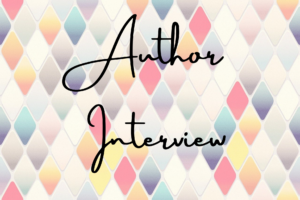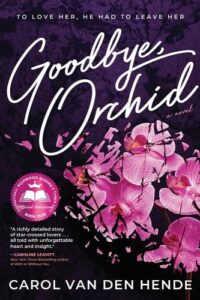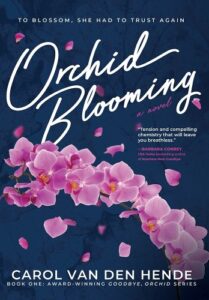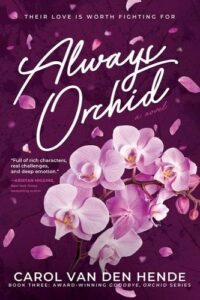Being Moved by Resilience: An Interview with Carol Van Den Hende
 The old idiom reminds us not to “judge a book by its cover,” but we’re going to ignore those words when it comes to author Carol Van Den Hende‘s Goodbye, Orchid series. Each book has a striking cover that draws readers into a “well-researched” and “well-written book” that features traumatized individuals and their capacities to grow. Readers have also called the stories “heart-wrenching,” “thoughtfully crafted,” and “riveting,” and words that must bring joy to Carol’s heart. The trilogy covers themes of love, loss, and redemption, and if you like reading inspiring novels with protagonists amid challenges, this series is probably for you.
The old idiom reminds us not to “judge a book by its cover,” but we’re going to ignore those words when it comes to author Carol Van Den Hende‘s Goodbye, Orchid series. Each book has a striking cover that draws readers into a “well-researched” and “well-written book” that features traumatized individuals and their capacities to grow. Readers have also called the stories “heart-wrenching,” “thoughtfully crafted,” and “riveting,” and words that must bring joy to Carol’s heart. The trilogy covers themes of love, loss, and redemption, and if you like reading inspiring novels with protagonists amid challenges, this series is probably for you.
Welcome, Carol!
Christina: Congratulations on the upcoming anniversary of Always Orchid, the third book in the Goodbye, Orchid series. The books feature Orchid Paige and Phoenix Walker. Where did the inspiration for the story come from?
Carol: The idea for Goodbye, Orchid came from a story on the news of a combat wounded veteran. I was moved by his resilience and started researching the experiences of wounded veterans. One soldier, Sgt. Bryan Anderson, explained that he’d been “blown up” (his words) by an improvised explosive device (IED). He’d forever deal with the disabling injuries that resulted. Yet despite losing both legs and his left arm, he had built a life he loved. He worked as a disability advocate, wheelchair designer, actor, and spokesperson for USA Cares and Gary Sinise Foundation, among other pursuits.
Bryan and others like him inspired me to imagine the character of Phoenix Walker. Phoenix isn’t a soldier but his experience mirrors that of wounded veterans. He’s a big-hearted agency founder who heroically saves a man from jumping in front of an approaching train. Sadly, he ends up on the tracks himself. His injuries are like those of wounded soldiers.
One of the earliest scenes that I wrote was when Phoenix wakes in the hospital and realizes he’ll never be the same again. He’s also faced with the hardest decision of his life: Does he burden the woman whose traumatic childhood makes him feel protective of her? Or does true love mean leaving her without explaining why?
I brought this scene to a writers’ group called Women Who Write. This group would meet every other Saturday at a member’s kitchen table and read our work aloud to each other. We learned a lot by observing the impact our work had on others. One fall Saturday, I passed out my printed passages and nervously awaited the groups’ reaction as I narrated Phoenix’s point of view:
His brother Caleb’s brows furrowed. “You were in an accident. You’re in the hospital.”
“In the hospital? What do you mean?”
This makes no sense. I need to finish a campaign pitch . . . brunch with Mom . . . Orchid.
He twisted against the pillows, eyes shut again, exhausted by their exchange.
His brother kept talking. Phoenix couldn’t concentrate as memories started to unlock. Orchid at the airport . . . back to my place before meeting Mom. The subway station. The homeless guy with the beard. Oh my God. Losing my balance, flying through the air . . .. His eyes squeezed tighter, shutting out the scenes that clamped around his chest until he couldn’t breathe.
Can’t be.
He struggled to move. Pain pierced through his leg, as if it was on fire.
Caleb put a supporting hand on his brother’s shoulder. Phoenix opened his eyes to find his brother still toting the cup. He reached for the water. Clumsy with grogginess, he knocked it over. The water spilled onto the bedspread. Phoenix instinctively threw out his left hand to steady the cup.
He whiffed air.
Confused, he regarded his arm. Bandages ended inches above where his wrist should’ve been. Bile spiked in his throat.
As I read, feeling the emotion of the passage move me as it had when I’d written the lines, I noticed a change in the room. The sound of scribbled notes subsided. One writer sniffled. Another rooted through her purse and emerged with a tissue. Our leader patted the silky skin beneath her eyes.
In that moment, I realized the power of this story. Not just to heal me, but to move others. The seed of an idea took hold. That’s when I started pursuing publishing. Then, after my debut novel released, readers began to ask me for more of Phoenix and Orchid’s story. So I penned the prequel, Orchid Blooming, and sequel, Always Orchid.
The series aims to touch readers, so it’s especially gratifying to receive wholehearted endorsements, like this one for Goodbye, Orchid from Caroline Leavitt, a New York Times Bestselling author, who said, “A richly detailed story of star-crossed lovers…all told with unforgettable heart and insight.”
Christina: While crafting my questions, I kept coming back to one regarding the main character’s first name: Why Orchid? The flower symbolizes many things—love, beauty, fertility—and has great significance in Chinese culture, a heritage both you and Orchid share. Does the orchid represent something specific to you? Did you ever consider other names for the character?
Carol: Orchid is the perfect name for my main character, because just like my protagonist, these flowers have a reputation for being delicate, but in the wild, they’re actually resilient and hardy. This encapsulates the story’s central dilemma as her love Phoenix believes he must protect her from the truth of his accident, thinking that it will trigger her PTSD. However, she ultimately proves her strength. I love this quote about orchids: “The orchid grows where others cannot, enduring the hardships of hunger and thirst. Even with all the difficulty of its life, the orchid graces the world with beautiful colour and rare fragrance.”―Confucius
Here’s a passage where Orchid, her aunt and her friend discuss the meaning of her name:
“That’s messed up. Your accident happened because you went to give her a ride, and then she leaves you?” Ayi’s indignation stopped her in her tracks. Orchid paused and took in the blush traveling up her aunt’s neck.
“Yup,” he said.
“Give me her number. I’m not kidding.” Orchid shook her head.
Billy’s scrunched forehead relaxed as the two women came to his defense. He restarted their stroll through the open-air tunnel. “You said Phoenix tried to hide what happened to him from you. Tell me the truth. Is it ever hard?”
Aunt Lily tilted her chin to the right. “What?”
Seeing Phoenix’s story from her aunt’s viewpoint put it in fresh perspective. “His accident. He didn’t want to tell me.”
“Do you ever think about leaving?” Billy asked. She could tell that her answer mattered to him.
“If I understand what you’re asking, no, what he’s missing is never going to make me leave.” She shook her head at the injustice that an injury like Billy’s could trump love.
“Your conviction reminds me of the philosopher Confucius’ poem. He said, ‘The orchid grows where others cannot,’ ” Aunt Lily quoted, gifting Orchid acceptance she didn’t know she’d craved. “It’s why your parents named you Orchid. Because Confucius believes that an orchid’s character shines through, no matter what hardships she endures.”
“What? That’s eerily prescient,” she replied, thinking of her parents’ accident, and Phoenix’s.
Billy nodded. “That suits you.”
Orchid felt her face grow warm with the compliment. “It almost makes me not mind getting orchids as gifts anymore.”
“They’re a sign of respect and admiration,” Aunt Lily said.
Christina: Can we talk a little bit about some of the heavy themes in the series? We encounter characters with both physical and mental health issues, including PTSD. How much research did you do in order to portray characters accurately? Did you find out anything surprising in your search?
Carol: Because the series is inspired by combat-wounded veterans, I wanted to portray these experiences with authenticity, to pay homage to these real-life heroes. So I took the research seriously. Meeting with wounded veterans taught me about the challenges that they can face, including the physical and emotional journey to healing, the effects of PTSD, and sometimes, difficulty transitioning to a civilian career. Each book in this trilogy deals with an aspect of these challenges. My first novel, Goodbye, Orchid, describes Phoenix’s journey after a disabling accident and was deeply researched with wounded veterans, medical professionals, and psychologists.
Experts played a key role in my prequel, Orchid Blooming, as well. For instance, SSGT Aaron Michael Grant read my entire manuscript and shared invaluable input based on his personal experience with PTSD. Clinical Director and trauma specialist Joe Dennis provided important perspective on healing trauma. They’re both thanked in my book acknowledgments, along with scores of others who’ve made this trilogy possible.
The finale to my trilogy, Always Orchid, touches on the difficulty veterans can face when demonstrating that their military skills are transferable to civilian jobs. Kirkus Reviews named the book a Top 150 Fall Read, calling it “an engrossing, inspiring depiction of traumatized individuals growing amidst challenges.”
One surprise was when I asked Sgt Bryan Anderson whether he wishes he could undo the accident that took three limbs. He thought a moment, and then shook his head. “My experiences make me the person I am. I wouldn’t change a thing.”
Christina: In Always Orchid, the characters move to China, where they struggle with “China’s superstitions against people with disabilities.” What are those superstitions and where do they come from? What message do you hope readers take away from the book regarding abilities and disabilities?
Carol: Let’s let my characters answer in their own words. Here, main character Phoenix is explaining the superstitions over lunch with his friend:
Phoenix ignored his interjection, and continued, forming the idea as he talked. “I keep thinking there must be a way to help people with disabilities. Lobby for accessibility. Get people the basic medical equipment they need. In China, we could start with awareness, overcome prejudices.”
“Overcome prejudices?” Kit’s skepticism was evident in the way he wrung his napkin with both hands. Two hands. His friend tossed the tortured fabric onto the table, where the cloth surrendered face down in the orange sauce.
“Some of it is rooted in Buddhist and Confucius beliefs, you know.”
“You mean the idea of karma?”
“Yeah, you do something bad in your past and get payback in your current lifetime.”
“Not sure how you’re going to overcome beliefs steeped in thousands of years of tradition.”
“Well, first of all, disability isn’t inherently something bad. It’s been an adjustment for me, a different experience, but not necessarily bad. People can change. For one, we could educate them on how prevalent it is. Globally, almost one in six people has a disability. If you make it to old age, there’s an 80 percent chance you’ll acquire some type of disability.” He’d always admired the wounded warriors whom he’d met through his advertising campaigns. Then after his own accident, his respect trebled. Every day required a heretofore untapped strength. Not just physical aptitude to navigate stairs and a world that assumed four capable limbs, but also the mental fortitude to slough off the sideways glances and assumptions of weakness.
“Gotta hand it to you. Hearing you talk about it is changing me.”
“One down, a billion more to go.” Phoenix’s lip twitched with humor.
I’m really proud that my books have won awards for disability awareness and that readers say the stories deepen their empathy for disability.
Christina: In an article you wrote in 2020, which is subtitled, “Three lessons on successful career reinventions,” you mentioned that your family steered you from literature to engineering. The action benefited you: learning how to problem solve has been very useful in your career. What else from your engineering background do you use in your writing and marketing? How does your background show up in the narratives?
Carol: What a great question! Science provides helpful frameworks for making sense of the world. The scale of the universe helps us put our lives into perspective. My main character Phoenix often uses science analogies, which comes from my engineering background.
He bent and touched his lips to hers until every subatomic particle bloomed to its fullest glory. He tingled her skin with a kiss like no other, one that evoked thoughts of an expanding universe and the study of numbers beyond infinity.
The other part of my background that comes through in my storytelling is the fifteen years I spent marketing brands for Mars Incorporated. I loved leading iconic brands like M&M’S®, DOVE®, MILKY WAY® and TWIX® (where I launched TWIX Peanut Butter). In my Goodbye Orchid series, main character Orchid Paige works as a marketer in the beauty industry. Because of these experiences, I also love teaching workshops at writing and publishing conferences.
Christina: In that same article, you encourage readers to “experiment, explore, and embrace opportunities.” Simple, concise, but sometimes difficult to do. Do you have any tips for people who might have reservations about taking a risk and pursuing an unfamiliar path?
Carol: I find it helpful to be clear about your “why” to stay focused on difficult tasks. Ask yourself why you do what you do, beyond the obvious profit and functional purposes. For example, my mission is to inspire hope and empathy for people and planet.
Christina: You’re a member of the Women’s Fiction Writers Association. What does that organization mean to you?
Carol: Authors form a supportive community. I love being among other women’s fiction writers.
Christina: Readers always love to read about pets. Do you have any? What would you like to share about them?
Carol: Yes, we love being pet parents! Our ginger kitties warm my lap during long writing sprints and keep our family entertained with their silly antics. They’ve even posed with my books (and been paid handsomely with treats!)
Christina: What’s next for you?
Carol: I’m inspired by events from my grandparents’ exodus from China and have been researching that era for my next book. More to come on this in the future!
Carol can be found in multiple places!
Website: https://carolvandenhende.com/
X: @c_vandenhende
Instagram: @carolvandenhende
Facebook: @carolvandenhende
BookBub: @CarolVanDenHende
Thanks to Carol for agreeing to this interview! If you know of an author or artist who’d like to be featured in an interview (or you would like to be featured), feel free to leave a comment or email me via my contact page.




Christina, these were insightful questions. Thanks for the wonderful interview!
Thank you so much! I’m so glad we could coordinate our schedules!